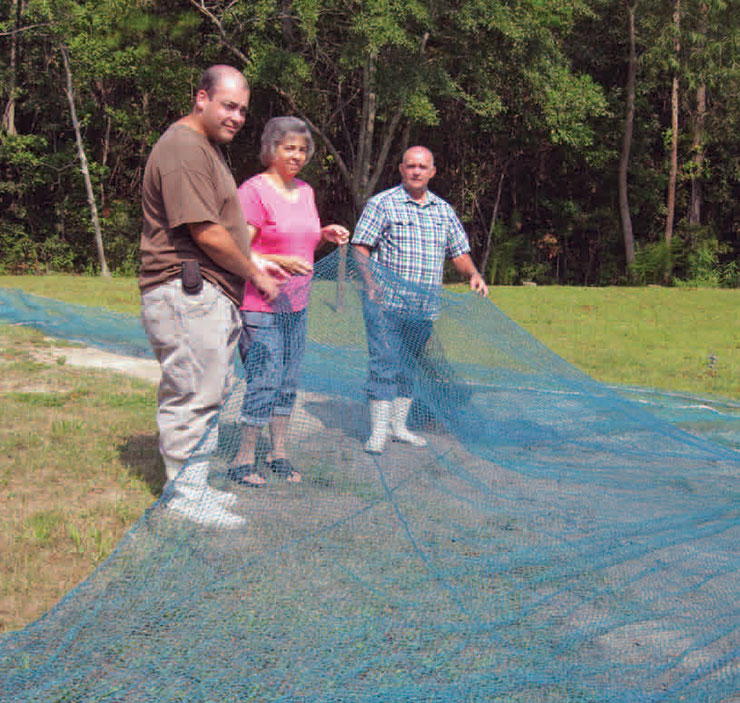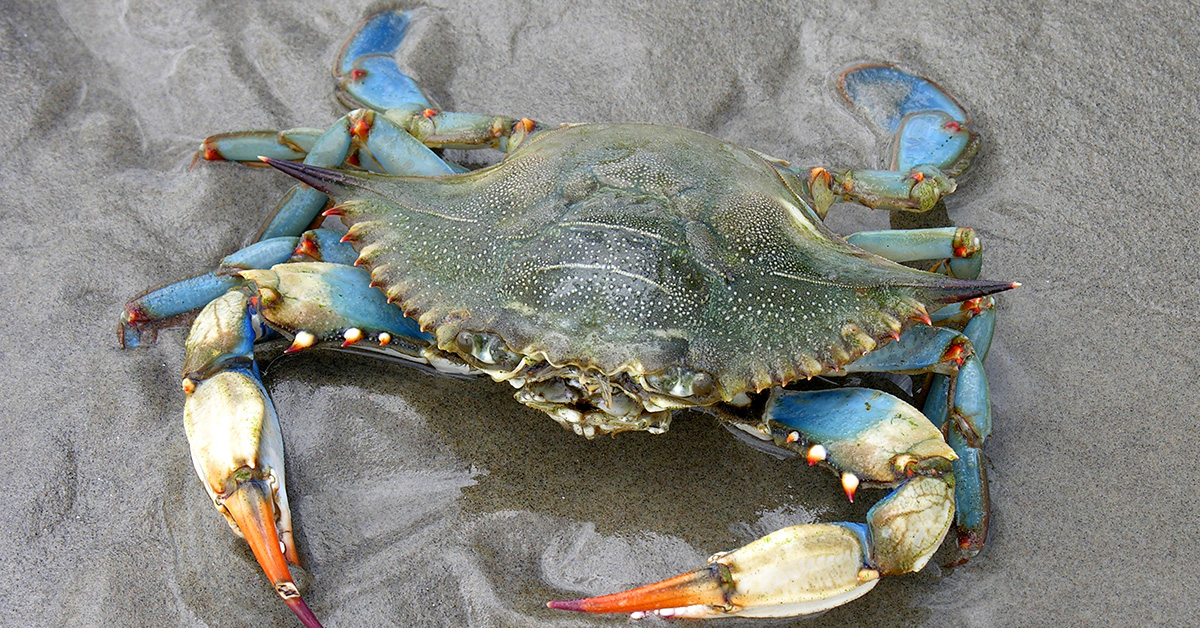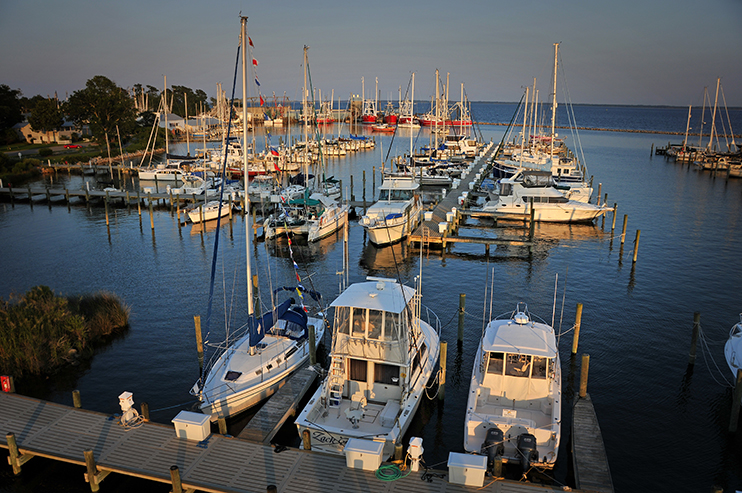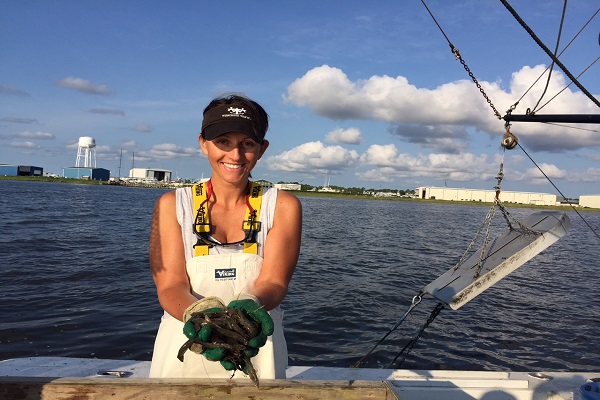Wild Caught: The Life and Struggles of An American Fishing Town

For centuries, small-scale commercial fishers have ventured forth into the Atlantic to hunt for shrimp and finfish. Recently, they forces of modernity — from ever-tightening regulations to a rise im imported seafood to explosive coastal growth — have threatened their proud way of life.
Four fishing families who have been “in the life” for generations are featured in the documentary Wild Caught: The Life and Struggles of an American Fishing Town, filmed over a seven-year period in the tightly knit community of Sneads Ferry.
These small-scale or artisanal fishermen seek to harvest the sea in a sustainable way — as reflected in their efforts to establish a shrimp nursery area. They are closely tied to the natural world, deeply respect the ocean and desperately want to continue their way of life.
Like family farmers, they must cope with an extremely competitive market, and are vulnerable to weather and natural disasters. But, while most traditional farmers own their land, no one person owns the ocean.
And the sea is a dangerous environment — commercial fishing is one of the most hazardous jobs in America, according to the Bureau of Labor Statistics.
Most of the fishing families featured in the film attended its premiere, April 29, 2006, at the University of North Carolina at Greensboro (UNC-G). They received a standing ovation. The audience fell in love with the fishermen and the town.
At subsequent screenings and film festivals in Maryland, Louisiana and North Carolina, their stories have struck a chord with viewers. The film not only speaks to issues concerning fishing, but also to a sense of cultural heritage, tradition and community.
In the months since the initial screening, Sneads Ferry has been locked in a struggle over its identity — indeed, some say, over its very survival. Land prices and taxes are rising fast. The rate of growth is astonishing.
Many families say they feel pushed out of their own town, question whether, 20 years from now, Sneads Ferry will still be a “true” fishing community. In the meantime, the fishing families, the state and the community at large look for solutions that may help retain Sneads Ferry’s fishing heritage.
Read on to get to know three fishermen of Sneads Ferry — a crabber, a shrimper and a snapper grouper fisherman.
JOHNNY WAYNE MIDGETT
At age 38, crabber Johnny Wayne Midgett has already spent two-thirds of his life working the river. Past president of the New River Fishermen’s Association, Johnny Wayne is a natural leader, with a great ability to tell a story. He is an amazingly strong man who never worked out in a gym. His “real” muscles come from a life of physical labor. Johnny Wayne could be called intimidating in terms of his looks — he has a deeply tanned face with a black beard and does not smile a lot. He is actually a gentle giant with a positive outlook on life and his chosen profession. His wife, Kim, grew up in the village. Together they have four kids: Kayla, Andrew, Zachary and MacKenzie Gayle. Andrew already knows what he wants: to be a crabber like his dad.
Johnny Wayne has done virtually every type of fishing. This is not unusual in Sneads Ferry, given the seasonal nature of the work. He now earns his living as a crabber, but he has shrimped, clammed and finfished.
JOHNNY: Sneads Ferry is really a fishing community. There’s not many people that has lived here over the years that weren’t involved in fishing some way. Kim’s family, you know, they — they fish too. They still fish right on.
Sneads Ferry — it was just real quiet, you know, and real peaceful. Weren’t no crime, just — it was real nice to grow up in Sneads Ferry. It still is, you know. It’s just a nice, small community.
My grandfather was a fisherman, and my father was. And it’s just been passed on from generation to generation. I started fishing when I was about 10 years old, going out with him. We used to shrimp every summer. And then when I got to be about 14, I started crabbing, and that’s what I mostly do now. When I got out of school that’s what I started doing.
Fishing’s a way of life. It’s just — it gets in your blood, and you just can’t get rid of it, you know. It’s just enjoyable work. You get to be your own boss and you get to do like you want to, really. I mean, if you can make a living at it and do good, I mean, why wouldn’t you want to be a fisherman?
I enjoy the work more than I do the money, you know, because I know there’s not that much money. You’ll never be rich working on the water. I don’t know nothing else I could do that I enjoy that good, far as work. I couldn’t stand to work in a building.
One reason it’s enjoyable is that you don’t really have to answer to nobody but yourself.
A lot of them’s got out of fishing, because they just wanted to move on and do different things. And a lot of the younger people weren’t interested. Years back it was a lot more people involved in the fishing, because there weren’t nothing else to do around here, you know. Fishing and farming was the only two things there was to do on Sneads Ferry at one time, and the military base come along, and a few people worked over there. But basically your farmers would farm through the summer, and they would fish in the fall, like for mullet, and then they would oyster through the wintertime. And there was a lot more people involved in there, because the young people was involved with fishing because there weren’t no industry.
Now that the Food Lion came, and McDonald’s, and just all different little stores and stuff, a lot of your younger people has got away from working in the water. You work inside, and you ain’t working in the weather. The weather can be bad a lot of times.
JOHNNY ON HIS FAMILY:
My wife Kim, I’ve knowed her my whole life, anyway. We grew up together and went to school together, and somehow we just got together here… and got married and had four children.
I love my family, and I wouldn’t take nothing for them. Family’s what it’s all about, anyway. I mean, I’m never going to have no money, but I’m rich. I’m the richest person in the world, because I got just what I wanted. I got a family.
My father, he’s semi-retired from fishing anymore. He don’t fish as much as he used to. And most of the times he’s always waiting for me when I get there. You know, like, especially when I’m working late in the fall, and it’s close to dark. He knows it will be late when I get in. He’s always waiting for me.
You can never tell — you’re going to have motor problems, broke down, or something. It’s real dangerous out there. My grandfather, he died on the water, and my wife’s father did too. There’s been quite a few around here who’ve died out there.
MACK LIVERMAN
Mack Liverman is regarded as one of the premier shrimpers in Sneads Ferry. Like many others, Mack grew up in “the ferry” and has done virtually every type of fishing in his more than 40 years of working on the water.
Though they are competitors on the water, neighbors in a small town like Sneads Ferry stick together. If one is in trouble, others do not hesitate to help.
Mack is a natural leader, with a ready smile and a melodious voice that could belong to a disc jockey. His audience includes fellow captains and the crews who appreciate his soothing tones over the VHF radio as they head through the inlet at 3 a.m.
Mack and his wife, Ellen, have raised two daughters in Sneads Ferry. Both Teri and Christine have crewed for Mack. The family (including two retrievers that enjoy a steady diet of shrimp) lives in a doublewide trailer located on a narrow blacktop road. Like other homes in Sneads Ferry, the liverman place is almost always busy with grandkids and various relatives popping over. That’s the way they like it.
MACK: My grandparents and my parents were fishermen. And I’ve been doing it since I was in preschool, with my father. And I’ve been doing it on my own for 41 years.
It’s like anything else in the fishing industry. If you’re going to make a go of it, you’ve got to be a family. You and your crew has to be tight-knit. If one person has a grudge with the other, they can make the work so hard on one person, they can’t handle it.
Everybody works together, and everybody helps each other. And when we’re working, there’s no captain and no crew. It’s myself — and whoever’s working with me. And I think that’s the way it has to be.
Fishing gets in your heart, that’s for sure. It’s a love, like the first girl you meet when you’re a teenager. You fall in love with shrimping, and there’s nothing else. I can’t imagine ever doing anything else.
I’ve tried working on a public job for about three weeks when I was in my early 20s I signed off on that, I couldn’t handle it. This way, I’m my own boss. When the weather will let me work, I work. Sometimes we push it to the extreme and work when we shouldn’t.
I work seven days a week when the weather’s permitting. We have a season on shrimping, and we have a season on oystering. When we can’t oyster, we shrimp. When we can’t shrimp, we clam. When we can’t clam, we either catch spots or mullets.
You don’t think of the danger. If it happens, it happens. You try to be as safe as possible. But if you’re not willing to take any chances, you’re not going to make a living in this business. We do our best shrimping when it’s too bad to be there.
I’ve had two boats sink out from under me. I had one sink 20 miles offshore and not another boat in sight, and it blowing 70 miles an hour. But we were fortunate. We run the boat with the engine completely submerged under water for four hours. She was completely full of water. We had every pump going — we got in a gale of wind, which weren’t forecast. And we beat a plank off the bottom. And all this happened within a 30-minute period. But we lucked out. The engine kept cranking until we could run it on an island. And me and the crew survived, but the boat didn’t.
For 10 or 15 years after that, I had dreams about it at night. I’d wake up, cold sweats, you know. I… I was there all over again.
MACK ON THE FUTURE OF FISHING:
There will be somewhat of a future, but not the way of life that we had. It’s going to be regulated to the point where the only trawlers you’ll have in another 25 years will be big, company-owned trawlers.
The little individual people like we are, we’ll be phased out, because we just won’t be able to make enough money to fight the government and the people that’s pushing for it.
I’ve heard a lot of people talk about fishing boats as eyesores. They move to the south to see the shrimp boats and the commercial fishing. Now they have the beaches cluttered with condos, and now our fishing boats has become eyesores.
And that’s the people we’re up against, the people that’s got the money. They spend more on a luncheon than we make in a month.
MICHAEL “CHOPS” COWDREY, JR.
Chops loves pork chops, and that affinity became his moniker. Now he has the word tattooed on his beefy arm. A high school wrestling star, he is muscled and tanned from years on the water. His father had him do “road work,” running five miles on the beach every morning all through high school, while he learned the ropes of fishing.
Now 26 years old, he has recently married and is determined to be a fisherman. He wants to raise a family in Sneads Ferry and to carry on the traditions of the water. Like other fishermen, he has tried all sorts of fishing, but deep-sea fishing in the Atlantic — 60 to 70 miles from shore — is his current specialization.
CHOPS: I learned to walk on a shrimp boat right on this river. I was 8 when it became a real job. When I was 12, I started paying income tax. Pretty much all I did was go to school and work. I spent most of my time on the boat. Pretty much all my friends were fishermen’s sons.
I’ve already made a life of it. Sometimes you’ll see schools of dolphins, whales. Sometimes you’ll see a freak of nature. Fish will start jumping out of the water for no apparent reason. They’ll circle the boat!
When you go commercial fishing, you have to catch a load of fish. You can’t just catch four or five fish for fun. You got to go out there when they’re knotted up. You got to catch a thousand pounds a day.
Most trips last about four days. We start out about 50 miles offshore, then work our way to about a 130-foot of water. We’re going for grouper, reds, gags. Fish have “hook sense,” and within five or six minutes we have to move on to another spot.
Water temperature has a lot to do with it. Where the warm water meets the cold water is where they’re schooled up. Right there at the edge of the Continental Shelf. Where we go you’re not targeting the fish that you’re hunting. You got to find its habitat, and then hunt it.
There’s ledges and rocks out there. If the wind blows one way, the fish are going to be in a certain ledge, because that’s just the fish’s nature… Fish are funny. I grew up on the boat, and I’ve seen rough weather since I was real young. I’ve fished with my dad my whole life. My dad and my mom were both in the Marines. They met at Camp Lejeune. Dad started fishing with locals. They taught him. When I was 10, my dad and I rebuilt a V12 diesel. We both can do fiberglass, woodwork, hydraulics.
Everything on the coast changes all the time. You have to be a waterman and know how to read water and tides.
It takes a lot of experience. You have to make a lot of mistakes. There’s people around here that have been fishing their whole lives that are 60, 70, 80 years old. There’s a lot that I know that most people don’t, but I have a lot more to learn.
CHOPS ON THE FUTURE:
You’re always going to be able to fish here, I believe, but it’s going to be a lot harder, and there’s going to be a lot less waters to fish in. And with people developing along the coast, it’s going to get worse. People will buy waterfront property and put a dock in there, and then they don’t want anybody fishing around their dock.
CHOPS ON WHAT HE LOVES ABOUT THE LIFE:
I love the sunrises and sunsets on the water. It’s so quiet. There’s no sound except for the water splashing on the boat. And the sky is real pretty — it’s just nice to be out there.
AFTERWORD
Wild Caught was filmed and produced with support from several grants from North Carolina Sea Grant, the North Carolina Arts Council and UNC-G. Since its premiere, Wild Caught has taken on a life of its own with screenings at film festivals worldwide. A companion book is in the works.
The film is the cornerstone of the Unheard Voices Project, a nonprofit organization devoted to recording the stories of workers whose livelihoods are threatened by glabalization, economic forces and technological change. Learn more about the project and check for scheduled showings of Wild Caught — including a 2 p.m., Jan. 18 event at the N.C. Maritime Museum in Beaufort — at www.unheardvoicesproject.org.
This article was published in the Winter 2007 issue of Coastwatch.
For contact information and reprint requests, visit ncseagrant.ncsu.edu/coastwatch/contact/.


